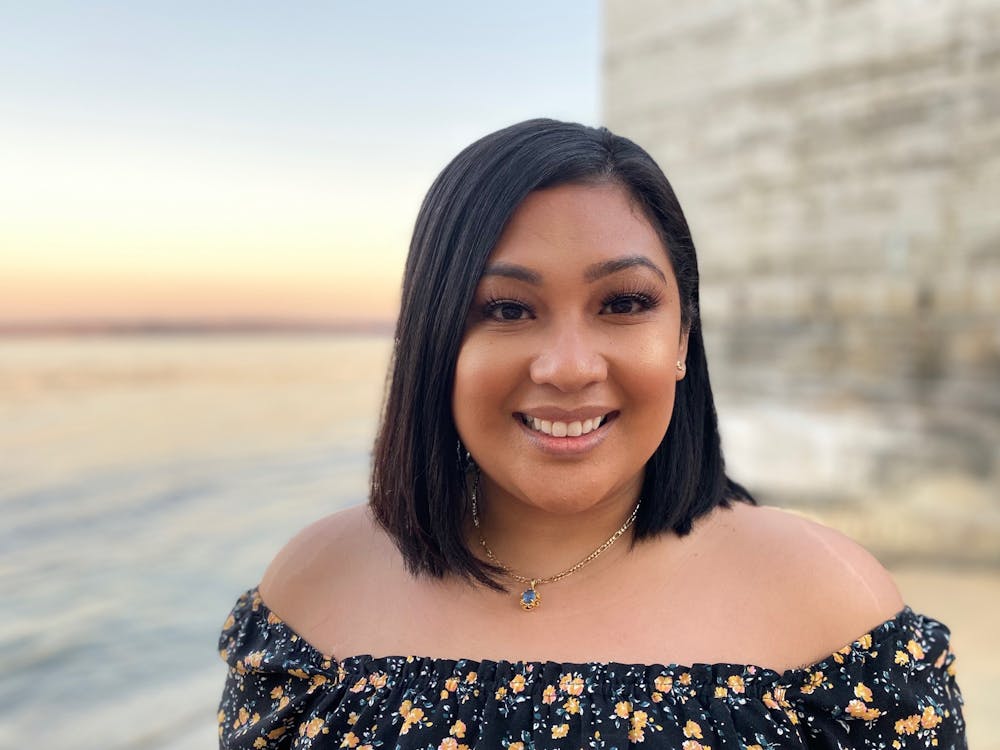Clariza Macaspac ’23, age 30 and a first-year in Butler College, is one of 13 admitted transfer students this year. She is also the University’s first enrolled female student veteran in the past decade.
As part of the growing presence of student veterans on campus, Macaspac expresses her appreciation for the University’s efforts to expand the veteran community, while also expressing her gratitude for her military experience in helping her grow as a student.
Prior to joining the military, Macaspac lived in Sacramento, Calif., where she attended community college upon completion of high school. On top of finding it difficult to pay for school, she recalled being unsure about what she wanted to study.
“I was going to classes, and I felt like I wasn’t being productive,” Macaspac said.
Her college life would change later when an Army recruiter visited her school. Originally, she said, she never thought she would enlist.
“The military was the last thing on my mind,“ Macaspac noted.
However, after speaking to the recruiter and learning more about what she could do in the military, Macaspac realized that it could not only help her pay for college but also provide her a great opportunity to live away from home and learn discipline. About a year later, Macaspac, then 21, officially joined the military, where she would serve for seven years.
While she initially wanted to be a nuclear engineer, her passion for learning languages led her to become a language analyst instead. She would later become a part of the Navy’s Cryptologic Technician Interpretive, which translates and analyzes communication signals. The specifics of her work there are classified.
Becoming a linguist required a long training process. After attending an eight-week boot camp in Illinois, Macaspac then spent one year in Monterey, Calif., learning Spanish. She signed up for aircrew service and underwent six months of rigorous water survival training, despite formerly not knowing how to swim, before being stationed in San Antonio, Texas, for three years. She was also deployed several times to regions in South America and the Caribbean.
“It really brought me out of my comfort zone, which was really my goal for joining, anyway,” Macaspac said.
In the latter half of her career, Macaspac returned to Monterey, California, as a division officer and military language instructor to teach new sailors joining the military.
“That was probably the most rewarding part of my career: going back to teach people Spanish and being in charge of the new sailors,” Macaspac said. “I learned a lot about leadership there. That's probably where I grew the most and what set me up to be ready for college again.”

Though she initially planned to remain in the military for 20 years, Macaspac knew it was time to return to school after seven years of service.
“The military was always a path for me to eventually return to school,” she said. “When I went back to the language school, I learned a lot. I took inspiration from the younger sailors.”
But the biggest inspiration still came from within.
“When I was at college the first time around, I was a poor student. In college, I didn't know what to do. I was not motivated to be there,“ she said. “I wanted a chance to redeem myself.”
Macaspac returned to community college for two years to reorient herself, where she began to make plans to attend a university. Reaching out to Service to School, an organization that helps veterans apply to college, Macaspac was able to attend a summit where she met veterans who attended top U.S. colleges.
“Seeing people achieve that dream, I thought, ‘I'm going to put all my effort into transferring into one of those schools,’” she said.
Hoping to research public health, Macaspac said she thought the University stood out to her because of its opportunities for independent research, notably its senior thesis. Additionally, she valued the University’s aid policy and willingness to connect with the veteran community.
Above all, Macaspac appreciates that veterans at the University are treated just like the general population.
Though Deputy University Spokesperson Michael Hotchkiss could not provide confirmation, Macaspac claims to be the first student to have been admitted from the waitlist out of over a thousand students who applied via the University’s reinstated transfer program.
“There are a lot of schools that have separate programs [for transfer students. Here], if I don’t tell people I’m a veteran, they probably won’t know. And I like that,” she said. “I like being able to come in as a student.”
Despite being the only female student veteran on campus, Macaspac feels comfortable sharing her identity with others.
“[Veterans] have such low visibility to begin with, so even though I am the only female, I don't feel any type of pressure being the only female, or I don't feel that there's that burden.”
Now, Macaspac immerses herself in her college life here on campus, regarding her current campus experience as enriching as her experience in the military. Finding the transition comfortable, she hopes to potentially concentrate in the Department of Ecology and Evolutionary Biology. She credits her military service with teaching her the tenacity, resilience, and discipline needed to succeed at the University.
While she admits that there could be increased veteran representation on campus, she is optimistic about the future of the transfer program, which has only been reinstated for two years.
In the meantime, Macaspac hopes to demystify the veteran experience for the broader University community.
“Not all of us see our service as sacrifice,“ she said. “We're doing our jobs. Many of us do not see ourselves as heroes."








